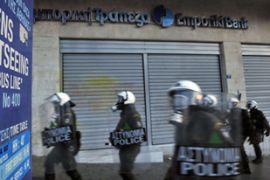Greeks protest over cut backs
Rally comes rising borrowing costs raises further fears over debt repayment.

Greece is borrowing heavily to make its next repayment on its huge debt.
‘Within targets’
However, its borrowing costs rose to a record high on Thursday as markets hit the country’s bond and banking stocks.
| in depth | |||||||||||||||
|
Bond investors are demanding higher interest rates, raising the prospect of a viscious circle of infleted borrowing costs and debt default fears, and threatening to put a EU and International Monetary Fund safety net of emergency loans agreed last month into action.
The cost of that borrowing had already jumped higher on Wednesday after the country’s banks asked to tap some of the $22bn still left in a 2008 IMF fund to help them cope with the credit crisis.
However, George Papaconstantinou, the finance minister, said the country’s austerity programme would work.
“I reiterate emphatically that the country continues and will continue to borrow normally,” Papaconstantinou said.
“We have a plan and the budget is being implemented properly and remains within its targets.”
Jean-Claude Trichet, the president of the European Central Bank, said that a default was “not an issue” for the country.
‘Time running out’
However, some analysts have said that the spike in borrowing costs will force Greece to use the EU-IMF rescue plan.
“There can now be little doubt that Greece will have to turn to the IMF for help,” Beat Siegenthaler, a UBS currency strategist, said.
With bond yields high and reports of depositors moving money out of Greek banks, “time could quickly run out,” he said.
Greece has said that if possible it will continue to borrow from markets rather then the EU-IMF package, which they see as a last resort.
It is trying to convince investors that it can shrink its huge deficit and eventually cut a debt load equal to an expected 120 per cent of its annual economic output.
It is facing weak foreign demand for its bonds and is struggling to raise about $22bn to roll over debt and cover spending through to the end of May.
